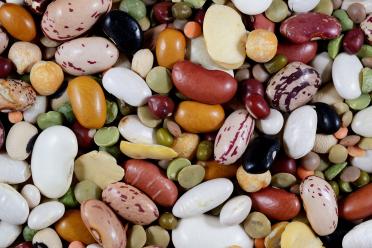Boosting beans for breeders
A consortium of partners from 16 countries will be contributing information about legume crops to a living database, allowing breeders to improve the peas and beans on our plates.
Legumes - including peas, beans, lentils, and soybeans - are an inexpensive and nutritious staple eaten around the world. They are a source of plant-based protein, fibre, essential minerals, and vitamins.
Despite their advantages over starchy cereals, such as wheat, their yield has only slightly improved in the last decades and there are few resources for breeders and researchers.

The Legume Generation consortium was awarded €8.6 million Euros (around £7.3m) in September 2023 and will run to February 2028. Funding comes from the European Union through Horizon Europe, with co-funding from UK Research and Innovation (UKRI).
The consortium has 32 partners from 16 countries, including New Zealand and the USA. More than 40 legume breeding and pre-breeding programmes will be contributing data, both from leading European plant research organisations and legume breeders.
The Earlham Institute is collating phenotypic and genetic data from members of the consortium into databases, managed by the Institute under FAIR principles and made available to breeders to improve legume food crops and animal feed.
Dr James Brett, based in the DeVega Group at the Institute, is Data Manager for the project. He is co-ordinating the flow of data, running bioinformatic analyses, managing the phenotypical and genotypical platforms, and curating data.
“Legumes haven’t had the attention that other crops have had,” he says. “But they’re high in protein and a staple food for millions of people.”

This legume data is a public good that can help promote sustainability and protein security in Europe and globally

Dr Jose De Vega
The five-year Legume Consortium programme concentrates on six crops; soybean, pea, lentil, and common bean are eaten all over the world, while lupin and clover are used as animal feed.
“These plants are also invaluable nitrogen fixers, meaning they transfer nitrogen into the soil in a form useful for other plants,” adds James.
Legumes naturally take nitrogen from the air and fix it in the soil, with the help of bacteria. Before industrial nitrogen fertilisers were invented, they were crucial in crop rotation schemes, often planted alternately with nitrogen-hungry crops like wheat to restore depleted soil and improve fertility.
As climate change consciousness sees growing numbers of people rethinking their diet legumes could be a ready replacement source of protein - an essential in the coming years as we move away from expensive and climate unfriendly meat.
But despite their benefits for both the environment and human health, legumes account for just 2-3 per cent of the cropping area in Europe. Most of the legumes Europeans consume are imported from other continents - including all the baked beans eaten in the UK.
Instead, European farming is dominated by starch-rich cereals - much of which are used to feed livestock. This leads to overuse of nitrogen fertiliser and expensive imported soy protein, contributing to environmental issues.
Growing more legumes would be beneficial for both human health and the environment. As well as their nutritional benefit, legumes play a valuable role in sustainable farming systems, their flowers are a source of pollen for insects and support more biodiverse ecosystems.

Breeders and researchers will be able to search for traits they are interested in, easily identifying which plants to cross-breed for desired improvements, or find markers to assist breeding for their trait of interest.

Dr James Brett
James is using the Earlham Institute’s Grassroots platform to record crop trial data for legumes. Grassroots was designed to curate data about wheat, but can be adapted for other crops. It will record physical data, including height, protein content, and biomass, and the unique features of each trial and location.
The second platform - which James is currently identifying - will record genomic marker data. He describes a constantly updating living database, managed by the Institute.
“The two platforms will talk to each other, cross-referencing markers with trait evaluations,” he says. “Breeders and researchers will be able to search for traits they are interested in, easily identifying which plants to cross-breed for desired improvements, or find markers to assist breeding for their trait of interest.”
Each crop has an associated work package linking practical breeding of a single species or species type with a research base. Field trials and genetic work are currently being undertaken.
Dr Jose De Vega, Group Leader at the Earlham Institute, says: “This legume data is a public good that can help promote sustainability and protein security in Europe and globally.
“We will ensure it is managed following the FAIR principles so the people that need it can make evidence-based decisions in their crop improvement. The consortium and our contribution will benefit the European society and the economy.”
Addressing global food security - one of the biggest challenges facing humanity - is a key part of the Earlham Institute’s organisational strategy. We are using our unique blend of science, expertise and infrastructure to work with national and international partners and deliver global impact.